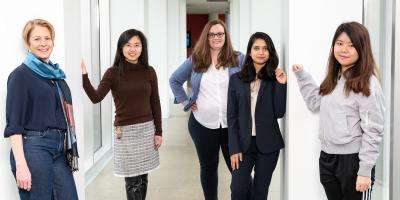Molly Wright Steenson is an expert on the history of AI and its relationship to computation in architecture. Her book, Architectural Intelligence: How Designers and Architects Created the Digital Landscape, examines architecture’s interactions with computation, cybernetics and artificial intelligence.
This merging of ideas is particularly relevant to a school like CMU, which emphasizes collaboration between departments. Throughout the history of the field of AI, architects and designers have helped impact the development of programming languages and the ways software is designed.
"We've been using the term Artificial Intelligence for 65 years," she said. "The term is old enough for social security!"
In addition to serving as the senior associate dean for research in the College of Fine Arts, Steenson holds the K&L Gates Career Development Professorship of Ethics and Computational Technologies. This means she teaches at the intersection of AI, design and architecture with a lens toward the ethical decisions a technologist might make.
"Design and architecture are the places where most people in the world encounter AI," said Steenson. "I try to get my students to be very critical of how users will encounter artificial intelligence and how our design decisions impact the world around us."
Steenson encourages all students to look toward AI, even if they're not programmers. In fact, Steenson said AI careers are increasingly seeking professionals outside the world of computer science.
"Everyone brings their own critical angle to research. If we don't design inclusively, we risk our AI amplifying or reinforcing biases," Steenson said.
Pictured above (from left): Molly Wright Steenson, senior associate dean of research for the College of Fine Arts and associate professor in the School of Design; Fei Fang, assistant professor in the Institute for Software Research; Nikki Lobczowski a postdoctoral fellow in the Human-Computer Interaction Institute; Sweta Priyadarshi, a graduate student in College of Engineering; and Yiwen Yuan an undergraduate student in the School of Computer Science.
Editor's Note: The reporting and photography from this story occurred before Carnegie Mellon moved its Pittsburgh campus online in response to the COVID-19 outbreak.
By: Katie Rank Lev klev@andrew.cmu.edu


